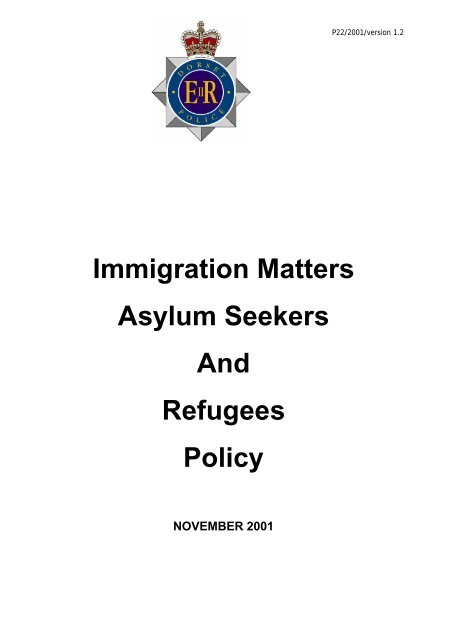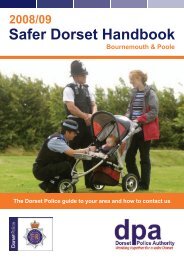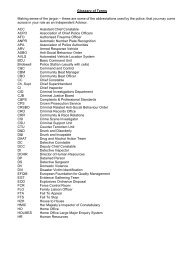Immigration Matters Asylum Seekers And Refugees ... - Dorset Police
Immigration Matters Asylum Seekers And Refugees ... - Dorset Police
Immigration Matters Asylum Seekers And Refugees ... - Dorset Police
You also want an ePaper? Increase the reach of your titles
YUMPU automatically turns print PDFs into web optimized ePapers that Google loves.
P22/2001/version 1.2<br />
<strong>Immigration</strong> <strong>Matters</strong><br />
<strong>Asylum</strong> <strong>Seekers</strong><br />
<strong>And</strong><br />
<strong>Refugees</strong><br />
Policy<br />
NOVEMBER 2001
A. POLICY AIM<br />
To provide officers with guidance in relation to the correct procedures when<br />
dealing with <strong>Immigration</strong> <strong>Matters</strong>, <strong>Asylum</strong> <strong>Seekers</strong> and <strong>Refugees</strong>. This includes<br />
definitions, procedures and protocols as agreed by ACPO.<br />
<strong>Dorset</strong> <strong>Police</strong> supports the ACPO Policy on <strong>Asylum</strong> <strong>Seekers</strong>.<br />
The joint aim between the <strong>Police</strong> Service and <strong>Immigration</strong> remains to support the<br />
<strong>Immigration</strong> Service in a manner that maintains and increases the trust and<br />
confidence of the public, and particularly members of minority ethnic communities.<br />
B. RATIONALE/LEGAL BASIS<br />
<strong>Immigration</strong> Act 1971 Section 24 (2)<br />
PACE Schedule (2)<br />
Sect 3 & 6 <strong>Immigration</strong> Act 1971<br />
Sect 4.3 <strong>Immigration</strong> Act 1971 (Power to make amendments)<br />
The <strong>Immigration</strong> (Registration with <strong>Police</strong>) Regs 1972.<br />
Home Office Circular 55/95<br />
Section 25 of the <strong>Police</strong> Act 1996.<br />
Joint protocol between the immigration Service and the <strong>Police</strong> Service for the<br />
Removal of <strong>Immigration</strong> Offenders. (01082001)<br />
<strong>Immigration</strong> and <strong>Asylum</strong> Act 1999<br />
Criminal Justice Act 1972<br />
Magistrates Court Act 1980 & 1982<br />
British Nationality Act 1986<br />
C. HUMAN RIGHTS CONSIDERATIONS<br />
(i) This policy has been drafted taking into account the Human Rights Act 1998.<br />
D. IMPLEMENTATION DATE<br />
November2001<br />
E. MONITORING/EVALUATION/ REVIEW PROCEDURE<br />
Policy to be reviewed after 6 months in operation<br />
F. POLICY TEXT<br />
.<br />
<strong>Dorset</strong> Special Branch has the responsibility to liaise with the <strong>Immigration</strong> Service<br />
in order to identify and locate illegal entrants and foreign nationals who are in<br />
breach of their landing conditions and to support the <strong>Immigration</strong> Service in the<br />
removal of failed asylum seekers.<br />
A joint protocol exists between the <strong>Police</strong> Service and <strong>Immigration</strong> Service in<br />
relation to the removal of failed asylum seekers<br />
1
A Special Branch Desk officer is based at Bournemouth who collects, collates,<br />
carries out analysis, evaluates and disseminates all Intelligence in accordance<br />
with the National Intelligence Model. The SB Desk Officer will act as<br />
a conduit between the <strong>Immigration</strong> Service and the <strong>Police</strong>.<br />
Liaison will take place between the SB Desk Officer, Divisional Commanders<br />
and Divisional Liaison Officers. Divisional Liaison Officers are the link<br />
between the Local Authorities and communities, their intelligence input is vital and<br />
must be submitted via the SB Desk officer for collation, analysis,<br />
evaluation and dissemination.<br />
The SB Desk Officer will regularly brief the Tasking and Co-ordinating Group<br />
on each Division with intelligence updates regarding the situation in relation to<br />
<strong>Immigration</strong> matters. The SB Desk Officer will also attend the Force Level<br />
2 Tasking & Co-ordinating Group meetings.<br />
All actions and requests from the <strong>Immigration</strong> Service will be<br />
dealt with via the SB Desk Officer. Risk assessments will be<br />
carried out in consultation with the Divisional Commander, this<br />
will include a <strong>Police</strong> Community Impact Assessment, Divisional Commanders<br />
Authorisation, <strong>Immigration</strong> Service Operational Assessment, <strong>Immigration</strong><br />
Operational Risk Assessment and Authorisation.<br />
<strong>Immigration</strong> legislation applies to all persons who are not British Citizens and who<br />
do not have right of abode in the UK. European Union (EU) Nationals are<br />
admitted to the UK without restriction provided they are in possession of a valid<br />
passport or national identity card.<br />
Definitions:<br />
An Overstayer or Illegal Entrant would include the following:<br />
A Foreign National having entered the country without leave i.e. entered the UK<br />
without passing <strong>Immigration</strong> Controls.<br />
A person in breach of a Deportation Order.<br />
A person who has remained in the country beyond the date issued by the<br />
<strong>Immigration</strong> Service either in a passport or visa.<br />
A person working in breach of their conditions to remain in the country i.e.<br />
Students.<br />
A person who fails to comply with a temporary admission or a restriction order.<br />
A person who enters the country by deception i.e. using a false or forged passport/<br />
documents.<br />
An Absconder is a person who avoids, postpones or ignores an immigration<br />
requirement.<br />
A Clandestine is a person who has entered the country without permission.<br />
2
An <strong>Asylum</strong> Seeker would include the following:<br />
A person who enters this country, claiming refugee status and applies to the Home<br />
Secretary for Political <strong>Asylum</strong>.<br />
Dealing with an Illegal Entrant<br />
Should an officer in the course of his duties encounter a person whom they<br />
reasonably suspect as being an illegal entrant, that person should be detained and<br />
conveyed to the nearest police station. Contact should be made with the Special<br />
Branch Desk Officer who will liase with the <strong>Immigration</strong> Service and arrange for<br />
their attendance at the <strong>Police</strong> Station.<br />
Dealing with an <strong>Asylum</strong> Seeker<br />
The <strong>Immigration</strong> Service will serve an individual claiming asylum with the<br />
necessary <strong>Immigration</strong> forms. Fingerprints, photographs, and temporary<br />
admission can be granted while an investigation is carried out. During this<br />
investigation the subject may be required to sign on at a nominated <strong>Police</strong> Station,<br />
not unlike bail conditions. These are known as Enforcement Distribution<br />
Directorate (EDD) cases and the appropriate Enquiry Office will have all the<br />
necessary paperwork. (Form IS96NW).<br />
If people voluntarily present themselves to a <strong>Police</strong> Station to claim asylum, the<br />
Special Branch Desk Officer should be contacted in the first instance. The<br />
<strong>Immigration</strong> Service will be contacted, if they are not available, the subject should<br />
be directed to ‘The Public Caller Unit, 1 st Floor, Block B. Whitgift Centre, Croydon.’<br />
Request for <strong>Police</strong> Assistance<br />
Primacy for the identification and removal of <strong>Immigration</strong> Offenders lies with the<br />
<strong>Immigration</strong> Service, however the <strong>Police</strong> Service are committed to support them in<br />
this responsibility.<br />
All operations will be based on confirmed intelligence and executed in<br />
consideration of the aforementioned risk assessments and authorisations,<br />
arrangements for assistance will be made after consultation with the Divisional<br />
Commander.<br />
Detainees will be conveyed in <strong>Police</strong> transport to the local <strong>Police</strong> Station where<br />
the <strong>Immigration</strong> Service will continue with their enquiries.<br />
The <strong>Immigration</strong> Service may have an Operation where a large number of<br />
offenders may be found, or where the apprehension of an offender /offenders is<br />
likely to attract particular public, media or Parliamentary interest. These sensitive<br />
Operations are authorised by the Director (Enforcement) of the <strong>Immigration</strong><br />
Service, and the authority of a <strong>Police</strong> Superintendent is required.<br />
3
Facilitation<br />
Where persons have entered the country without passing <strong>Immigration</strong> Controls i.e.<br />
in the rear of lorries, consideration must be given to the circumstances in which<br />
these people have managed to enter the country.<br />
Facilitation carries a maximum 10 years imprisonment and the offence is<br />
widespread. The offence of Facilitation will be dealt with by Divisional CID in<br />
consultation with the Crime manager.<br />
The National Criminal Intelligence Service (NCIS) has an Organised <strong>Immigration</strong><br />
Crime Section, and are interested in receiving any information regarding the<br />
facilitation of ‘clandestines’, to include details of persons entering illegally, the<br />
suspected facilitators, details of conveyances used and any copies of any relevant<br />
correspondence, documents, names and addresses. All intelligence should be<br />
forwarded to the SB Desk Officer in 5x5x5 format for collation and dissemination.<br />
Deportation<br />
The <strong>Immigration</strong> Service is responsible for all deportation cases.<br />
A Deportation notice is recommended by a Court and the Order is granted by the<br />
Home Secretary.<br />
Deportation Orders granted directly by the Home Secretary are rare and are<br />
issued with specific instructions from the Home Office.<br />
Foreign Nationals arrested for any offence, which carries a term of imprisonment,<br />
can be considered for deportation. A ‘Notice of liability for deportation’ (<strong>Dorset</strong><br />
<strong>Police</strong> C277 form) must be served no less than 7 days before sentencing, allowing<br />
the defendant 7 clear days to prepare reasons why they should not be deported.<br />
Best practice is to serve the C277 at the time of charging the defendant with the<br />
offence. CPS must be informed that the C277 has been served.<br />
The court can recommend issue the Deportation Order at the time of sentencing;<br />
the offender will be deported as soon as the sentence is served.<br />
The enforcement of Deportation Orders is the responsibility of the <strong>Immigration</strong><br />
Service, who will arrange any escort required. Most deportees travel unescorted.<br />
<strong>Immigration</strong> Offices having responsibility for this Force are:<br />
Poole Port 01202 673658. (First Call daytime)<br />
Bournemouth International Airport 01202 572515.<br />
4
Portsmouth 023 9285 2700<br />
Charging for Detention<br />
On certain occasions the <strong>Immigration</strong> Service will make requests that <strong>Dorset</strong><br />
<strong>Police</strong> detain immigration prisoners on their behalf, these are known as<br />
'<strong>Immigration</strong> Detainees'.<br />
Section 25 of the <strong>Police</strong> Act 1999 has been interpreted by the Home Office<br />
Resources Unit to mean that the housing of <strong>Immigration</strong> prisoners is not a police<br />
function. It provides Chief Officers of <strong>Police</strong> with discretionary authority for<br />
charging and recovery of costs in relation to such detentions.<br />
<strong>Immigration</strong> Detainee<br />
For the purpose of charging the <strong>Immigration</strong> Service, the term ‘<strong>Immigration</strong><br />
Detainee' applies to any person who has been served with 'Form IS 91R' by an<br />
<strong>Immigration</strong> Officer. The form ‘IS 91’ is served on the detaining authority, this Form<br />
delegates the Home Secretary's authority to detain such persons to a Chief Officer<br />
of <strong>Police</strong> or Governor of a prison. The purpose of detention is to deal with the<br />
detainee administratively, by deportation instead of resorting to the criminal<br />
process.<br />
It must be noted that charging the <strong>Immigration</strong> Service can only begin once<br />
the above Forms have been served. Therefore any time spent in <strong>Police</strong> custody<br />
prior to service cannot be recovered.<br />
However, where the arrest has been made by <strong>Immigration</strong> Officers or by <strong>Police</strong><br />
Officers in their presence then charging can commence as soon as the detainee<br />
comes into custody.<br />
It is the responsibility of the Custody Sergeant to submit the claim to the Finance<br />
Department at <strong>Dorset</strong> <strong>Police</strong> HQ.<br />
Income Generated<br />
All income generated by <strong>Immigration</strong> Detention claims will be credited to<br />
a central budget. Accountancy Services will consider making virements to<br />
appropriate budgets based on costs incurred as a result of <strong>Immigration</strong><br />
Detainees.<br />
G. RESOURCES<br />
The Resource implications in this policy involve recoverable costs.<br />
5
H. REFERENCE<br />
Policy reference: P:22 /2001/version 1.2<br />
Policy owner: Special Branch<br />
Version: 1.2<br />
I. AUTHORISATION/QUALITY ASSURANCE/APPROVAL<br />
Name Signature Date<br />
Prepared: DC 57 Allard 23/7/01<br />
Quality assured: DC 537 Forsyth<br />
HRA compliance: DC Forsyth<br />
Authorised: DCI 1281 BEEDLES 131101<br />
Approved:<br />
(Chair, Policy Group)<br />
Approval reference: Senior Officers’ Policy Group – (insert date/reference)<br />
J. REVISIONS/VERSION CONTROL<br />
Version Date Amended by Reason<br />
1.0 Initial Policy Document<br />
1.1 25/9/01 DC 537 Forsyth Templated.<br />
1.2 1311200<br />
1<br />
DCI BEEDLES<br />
AMENDMENTS<br />
6
Joint Protocol between the <strong>Immigration</strong> Service and the <strong>Police</strong> Service<br />
Risk Assessment Authorisation<br />
The attached matrix forms the foundation for the proposal and endorsement for operations at any level.<br />
The result of the assessment will influence the levels of resourcing and the nature of the operation.<br />
There are essentially three categories for resourcing an operation:<br />
1. <strong>Immigration</strong> Officers only (including the seconded officers referred to in paragraph 4.1.1) with local<br />
police awareness;<br />
2. <strong>Immigration</strong> Officers and police support immediate to the operation;<br />
3. <strong>Immigration</strong> Officers and police support immediate and ancillary to the operation.<br />
The <strong>Immigration</strong> Service will have responsibility for completing the operational aspects of the Assessment.<br />
The police will have responsibility for completing the community and crime aspects of the Assessment.<br />
The final assessment findings will be submitted for the local Divisional Commander's authority.<br />
The Risk Assessment document is recognised as:<br />
1. The <strong>Immigration</strong> Service endorsement of the intelligence and processes nominating the target,<br />
assuring the police of their duty of care for the lawful execution of their duty;<br />
2. The <strong>Police</strong> Service authority to proceed with the proposed operation at a designated time and distils<br />
the core principle of the police Service retaining control of the community environment;<br />
3. The agreement between the <strong>Immigration</strong> Service and the <strong>Police</strong> for the level of resourcing for each<br />
nominated operation;<br />
4. Recording the audit trail commensurate with the requirements of the Human Rights Act 1998 and the<br />
Race Relations (Amendment) Act 2000.<br />
5. Transfer of required operational data whilst maintaining individuality, confidentiality, where necessary<br />
in line with the Data Protection protocol.<br />
7
<strong>Immigration</strong> Service Operational Risk Assessment and Authorisation<br />
Introduction<br />
Notes for guidance<br />
The purpose of the Risk Assessment is to show an auditable process of decision making adhering to the<br />
principles of the Human Rights Act 1998 and the Race Relations (Amendment) Act 2000. The <strong>Immigration</strong><br />
service has primacy for operational activity in relation to <strong>Immigration</strong> offenders. The <strong>Police</strong> Service has<br />
Primacy for the community impact that any operation may have, therefore, any operation must be<br />
authorised by the local Divisional Commander acting as the ‘Gatekeeper' to the community. The Risk<br />
Assessment should determine the category of operation, in terms of the level of police involvement. This<br />
should not be confused with the 3 types of operation that the <strong>Immigration</strong> Service carries out.<br />
(Lower/Middle/Upper tier). The risk assessment is in 4 parts.<br />
Part 1 -<br />
Target details<br />
The <strong>Immigration</strong> Service will complete the details of up to 5 targets at one address. If there are more than<br />
five known targets then their details should included on additional sheets.<br />
Part 2<br />
<strong>Immigration</strong><br />
The <strong>Immigration</strong> Service will be responsible for completing part 2 of the process. The justification for the<br />
scoring on the form must be included on the form overleaf. This score will indicate the category of<br />
operation.<br />
Part 3<br />
<strong>Police</strong><br />
The local police will complete part 3 of the process. The justification for the scoring on the form must be<br />
included on the enclosed form. This score will indicate the category of operation envisaged from the<br />
perspective of the police.<br />
Part 4<br />
<strong>Police</strong> Divisional Commander<br />
The local Divisional Commander will review part 2 and 3 and make a decision on what type of category that<br />
the operation will be and whether it can go ahead, go ahead with conditions, or veto the operation.<br />
Part 5<br />
<strong>Immigration</strong> Service Acknowledgement<br />
The ~ <strong>Immigration</strong> Service Operation Commander will endorse the final part of the form to acknowledge<br />
acceptance of the level of authority from the Divisional Commander, and the operation ill be conducted<br />
commensurate with any conditions imposed.<br />
'Red flag' issues<br />
These are issues that are so important in there own right that they may affect the operation over and above<br />
the normal scoring system. These would be reviewed and specific control measures would need to be in<br />
place. Even with a low risk rating, a 'red flag' could change the category of the operation.<br />
Risk Assessment Justification Notes<br />
No GRADE JUSTIFICATION<br />
1<br />
2<br />
<strong>Immigration</strong> Service Operational Risk Assessment and Authorisation<br />
8
The Risk Assessment will consider three categories of information:<br />
1. The targeted individual(s);<br />
2. The targeted address(es), and;<br />
3. The likely community impact.<br />
The <strong>Immigration</strong> Service will have responsibility for Completing the operational aspects of the Assessment<br />
(Page 2 of this document).<br />
The police will have responsibility for completing the community and crime aspects of the Assessment<br />
(Page 3<br />
of this document).<br />
The final assessment findings will be submitted for the local Divisional commander's authority.<br />
The Risk Assessment document is recognised as:<br />
1. The <strong>Immigration</strong> Service endorsement of the intelligence and processes nominating the target,<br />
assuring the police of their duty of care for the lawful execution of their duty;<br />
2. The <strong>Police</strong> Service authority to proceed with the proposed operation at a designated time and<br />
distils the core principle of the police service retaining control of the community environment.<br />
3. The agreement between the <strong>Immigration</strong> Service and the <strong>Police</strong> for the level of resourcing for each<br />
nominated operation.<br />
4. Recording the audit trail commensurate with the requirements of the Human Rights Act 1998 and<br />
the Race Relations (Amendment) Act 2000.<br />
5. Transfer of required operational data whilst maintaining individuality confidentiality where<br />
necessary in line with the Data Protection protocol.<br />
Part 1- Target details<br />
Operational Reference<br />
__________________ Op. Commander:<br />
Target Nominals Name Date of birth M/F<br />
(Include a.k.a., and known CRO)<br />
1<br />
2<br />
3<br />
4<br />
5<br />
Target Address<br />
Proposed Date Time:<br />
Division/Command Area<br />
<strong>Police</strong> Liaison:<br />
9
<strong>Immigration</strong> Service Operational Assessment<br />
Nominal 0 1 2 3 4 5<br />
1. Number of persons sought Lower Middle Upper<br />
2. Likelihood of conflict / resistance<br />
3. Sensitive Factors - Religion<br />
4. Gender<br />
5. Nationality<br />
6. Known Associates<br />
7. Position in Society<br />
8. Family Connection<br />
9. High profile Media<br />
10. Children / Vulnerable<br />
11. Confirmation of identity<br />
12. <strong>Immigration</strong> Named Offender Assurance<br />
13. <strong>Immigration</strong> Offender – Removable? Yes No<br />
Premises 0 1 2 3 4 5<br />
14. Other persons present<br />
15. Difficulty of Premises<br />
16. Difficulty of Location<br />
17. Ease of Access / Egress<br />
Method of Entry requirements<br />
0<br />
Page Total<br />
<strong>Immigration</strong> Operational Risk Assessment Summary<br />
I have considered all the information and intelligence available to me in preparing this Operational Risk<br />
Assessment and based on this information, prior to the police assessment of the community impact and<br />
taking account of exceptional impact from 'red flag' issues<br />
ref.no. (Delete as applicable) I 2 6 7 8 9 10 13 N/A<br />
this operation should be carried out as:<br />
Score guide<br />
Category-1 0-15 <strong>Immigration</strong> Officers only with local police awareness<br />
Category-2 15-25 <strong>Immigration</strong> Officers and police support immediate to the operation<br />
Category-3 25-33 <strong>Immigration</strong> Officers and police support immediate and ancillary to the operation<br />
Signed:________________________________ Divisional Commander<br />
Date:<br />
10
<strong>Police</strong> Community Impact Assessment<br />
Nominal 0 1 2 3 4 5<br />
19. PNC Antecedents<br />
20. PNC Warning Signs<br />
21. Local Intelligence checks<br />
Premises 0 1 2 3 4 5<br />
22. Local Intelligence checks - Nominals<br />
23. - Crime<br />
reports<br />
24. Specialist Skills required<br />
Community Issues 0 1 2 3 4 5<br />
25. Other persons present<br />
26. Difficulty of Premises<br />
27. Difficulty of Location<br />
28. Ease of Access / Egress<br />
29. Method of Entry requirements<br />
30. Recent Events<br />
31. Frequency of Operations - <strong>Police</strong><br />
32. Media attention<br />
33. Local anniversaries<br />
34. Previous Operational Difficulties in<br />
Area<br />
35. Frequency of Operations - <strong>Immigration</strong><br />
Column Totals 0<br />
<strong>Police</strong> Community Impact Assessment Summary<br />
Page Total<br />
I have considered all the information and intelligence available to me in preparing this Community Impact<br />
Assessment and based on this information, taking account of exceptional impact from 'red flag' issues,<br />
Ref.no. (Delete as applicable) 20 21 22 23 26 27 28 29 33 34 N/A<br />
this operation should be carried out as<br />
Score guide<br />
Category 1 00-20 <strong>Immigration</strong> Officers only with local police awareness<br />
Category 2 21-40 <strong>Immigration</strong> Officers and police support immediate to the operation<br />
Category 3 41-54 Officers and police support immediate and ancillary to the operation<br />
Signed:__________________________ <strong>Police</strong> Liaison Officer<br />
Date:<br />
11
Divisional Commanders Authorisation<br />
I have considered the recommendation from the <strong>Immigration</strong> Service and police risk assessments being:<br />
<strong>Immigration</strong> Service<br />
<strong>Police</strong> Service<br />
Category I Category 2 Category 3<br />
Total Risk Assessment Score<br />
<strong>And</strong> based on these considerations I :<br />
1. Authorise the operation as proposed as Category:<br />
2. Authorise the operation as proposed as Category: subject to the following conditions.<br />
3. Do NOT authorise the operation at this time due to the following circumstances.<br />
Delete as appropriate<br />
Conditions/Circumstances (1ncIuding control measures required for ‘red flag’ issues)<br />
The resourcing commitment will be considered in light of this decision.<br />
Signed: ________________________________________________ Date:<br />
Divisional Commander<br />
<strong>Immigration</strong> Service Acknowledgement of Authority<br />
I confirm that the Operation will comply with the authority given in this Risk Assessment.<br />
Signed: ________________________________________________<br />
<strong>Immigration</strong> Op. Commander<br />
Date:<br />
12











